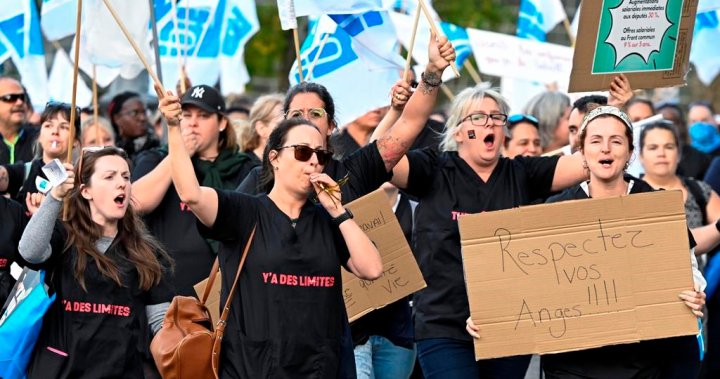Members of a union representing over 80,000 health care workers in Quebec have rejected a collective agreement endorsed by the union’s leadership. The Fédération interprofessionnelle de la santé du Québec, known as the FIQ, announced that 61% of members voted against the deal in an online election with a participation rate of 77%. FIQ president Julie Bouchard expressed disappointment but stated they are prepared to return to negotiations to address members’ concerns. The union will regroup with local representatives to determine the agreement’s shortcomings.
The tentative collective agreement included general salary increases of at least 17.4% over five years, new premiums for evening, night, and weekend work, increased flexibility for workers to control their schedules, and changes to vacation day accumulation and seniority recognition, among other measures. The rejection comes after 15 months of negotiations between the FIQ and the provincial government, as well as eight days of strikes by union members last fall. Bouchard did not rule out additional pressure tactics but emphasized that the focus is on negotiations to address members’ concerns.
Quebec Treasury Board President Sonia LeBel stated that the government will meet with the union to understand the reasons behind the agreement’s failure. She mentioned that the province would continue to seek more flexibility from FIQ members. Quebec has recently settled several labor disputes with other public sector unions, including a group representing 420,000 education and health-care workers who approved a deal with 17.4% pay increases in February. The rejection of the tentative agreement highlights the challenges faced in reaching consensus between the union and the provincial government.
The rejection of the collective agreement by FIQ members reflects their dissatisfaction with the proposed deal, despite endorsements from the union’s leadership. The union’s commitment to advancing members’ interests and addressing the agreement’s shortcomings demonstrates a willingness to prioritize workers’ concerns. The rejection comes after an extensive negotiation process and strikes, indicating the complex nature of reaching a satisfactory agreement between the union and the government.
Moving forward, the union will regroup with local representatives to assess the rejected agreement and determine next steps in negotiations with the provincial government. The focus is on finding solutions that address members’ concerns and improve working conditions for health care workers in Quebec. The government’s willingness to meet with the union and seek more flexibility from members indicates a commitment to addressing the setback and working towards a mutually beneficial agreement. The rejection of the tentative collective agreement underscores the importance of effective communication and collaboration between the union and the government to ensure a fair and sustainable agreement for all parties involved.















